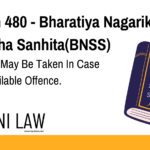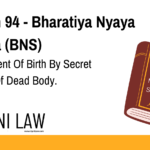Code: Section 483 BNSS
(1) A High Court or Court of Session may direct,—
(a) that any person accused of an offence and in custody be released on bail, and if the offence is of the nature specified in sub-section (3) of Section 480, may impose any condition which it considers necessary for the purposes mentioned in that sub-section;
(b) that any condition imposed by a Magistrate when releasing any person on bail be set aside or modified:
Provided that the High Court or the Court of Session shall, before granting bail to a person who is accused of an offence which is triable exclusively by the Court of Session or which, though not so triable, is punishable with imprisonment for life, give notice of the application for bail to the Public Prosecutor unless it is, for reasons to be recorded in writing, of opinion that it is not practicable to give such notice:
Provided further that the High Court or the Court of Session shall, before granting bail to a person who is accused of an offence triable under Section 65 or sub-section (2) of Section 70 of the Bharatiya Nyaya Sanhita, 2023, give notice of the application for bail to the Public Prosecutor within a period of fifteen days from the date of receipt of the notice of such application.
(2) The presence of the informant or any person authorised by him shall be obligatory at the time of hearing of the application for bail to the person under Section 65 or sub-section (2) of Section 70 of the Bharatiya Nyaya Sanhita, 2023.
(3) A High Court or Court of Session may direct that any person who has been released on bail under this Chapter be arrested and commit him to custody.
Explanation of Section 483 BNSS
Section 483 of the BNSS grants special powers to the High Court and Court of Session regarding bail applications. These higher courts are empowered to:
- Grant bail to accused persons in custody.
- Impose or modify conditions of bail.
- Revoke bail and order re-arrest.
This section is particularly important in cases involving serious crimes such as those triable exclusively by the Court of Session or punishable with life imprisonment. Special provisions apply to terrorism-related offences (Section 65) and organized crime cases (Section 70(2) of Bharatiya Nyaya Sanhita), requiring mandatory notice to the Public Prosecutor and presence of the informant.
Illustration
Example 1: Bail in Serious Offence
A person accused of a crime punishable with life imprisonment applies for bail in the High Court. As per Section 483, the High Court must notify the Public Prosecutor before granting bail unless it records valid reasons for not doing so.
Example 2: Terrorism Case
An accused under Section 65 (terrorist act) of BNS applies for bail. Section 483 mandates that:
- The Public Prosecutor must be notified within 15 days.
- The informant or their authorized representative must be present during the bail hearing.
Example 3: Modification of Bail Condition
A person is granted bail by a Magistrate with stringent conditions. The person appeals to the Court of Session, which uses its powers under Section 483(1)(b) to modify the bail conditions.
Common Questions and Answers on Section 483 BNSS
1. Can the High Court grant bail in any offence?
Yes, the High Court can grant bail in all offences, including non-bailable ones, subject to compliance with mandatory notice and procedural safeguards, especially in serious or specialized cases.
2. What happens if the Court of Session does not inform the Public Prosecutor?
If the offence is serious or falls under terrorism/organized crime, the court must provide written reasons for not informing the Public Prosecutor. Non-compliance can make the bail grant procedurally defective.
3. Is the victim or informant’s presence necessary during the bail hearing?
Yes, in cases under Section 65 and Section 70(2) of BNS, the informant or their authorized representative must be present at the time of hearing the bail application.
4. Can the High Court cancel someone’s bail?
Yes, under Section 483(3), the High Court or Court of Session can direct the re-arrest of a person who was earlier released on bail.
Conclusion
Section 483 BNSS reinforces the supervisory and corrective jurisdiction of higher courts over bail matters, especially in complex or high-risk cases. It ensures transparency, victim participation, and procedural safeguards in the bail process, thereby balancing the rights of the accused and the interests of justice.
For detailed legal guidance and case-specific support, visit ApniLaw today!
🚀 Explore more BNSS provisions on our website:
https://www.apnilaw.com/bare-act/bnss/









